-
 Bitcoin
Bitcoin $84,800.7048
2.32% -
 Ethereum
Ethereum $1,882.5584
2.87% -
 Tether USDt
Tether USDt $1.0000
0.01% -
 XRP
XRP $2.0968
-0.03% -
 BNB
BNB $603.2602
-0.62% -
 Solana
Solana $124.5532
-0.44% -
 USDC
USDC $0.9999
-0.02% -
 Dogecoin
Dogecoin $0.1707
1.90% -
 Cardano
Cardano $0.6689
0.47% -
 TRON
TRON $0.2384
0.86% -
 Toncoin
Toncoin $4.0121
-3.28% -
 Chainlink
Chainlink $13.7734
0.97% -
 UNUS SED LEO
UNUS SED LEO $9.4100
2.89% -
 Stellar
Stellar $0.2672
0.86% -
 Avalanche
Avalanche $19.2693
1.92% -
 Sui
Sui $2.3662
2.82% -
 Shiba Inu
Shiba Inu $0.0...01237
-2.05% -
 Hedera
Hedera $0.1657
1.14% -
 Polkadot
Polkadot $4.0848
0.85% -
 Litecoin
Litecoin $82.9308
-0.63% -
 MANTRA
MANTRA $6.2006
-1.38% -
 Bitcoin Cash
Bitcoin Cash $304.9806
0.27% -
 Bitget Token
Bitget Token $4.5883
-0.15% -
 Dai
Dai $1.0001
0.02% -
 Ethena USDe
Ethena USDe $0.9998
-0.01% -
 Pi
Pi $0.6918
-2.64% -
 Hyperliquid
Hyperliquid $13.0896
-1.19% -
 Monero
Monero $218.5433
0.66% -
 Uniswap
Uniswap $6.1491
2.50% -
 Aptos
Aptos $5.2452
-0.95%
is bybit wallet a non custodial wallet
Bybit Wallet is custodial, meaning Bybit holds your private keys, offering convenience but less control over your crypto assets compared to non-custodial wallets.
Mar 26, 2025 at 07:07 pm
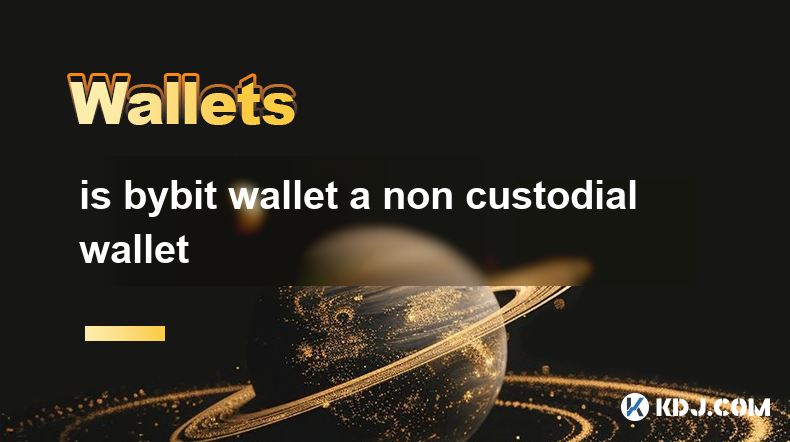
Is Bybit Wallet a Non-Custodial Wallet?
Bybit, a popular cryptocurrency exchange, offers a wallet service integrated within its platform. However, understanding whether this wallet is truly non-custodial is crucial for users prioritizing control over their digital assets. This article delves into the specifics of Bybit's wallet functionality and clarifies its custodial nature.
Understanding Custodial vs. Non-Custodial Wallets
A non-custodial wallet gives you complete control over your private keys. These keys are essential for accessing and managing your cryptocurrencies. You are solely responsible for securing them. Losing your private keys means losing access to your funds.
Conversely, a custodial wallet, like the one offered by Bybit, means the exchange holds your private keys on your behalf. This offers convenience but sacrifices complete control. While Bybit manages security, you rely on their systems and practices. This introduces a degree of trust and potential vulnerability.
Bybit Wallet: A Deep Dive
The Bybit wallet is inherently a custodial wallet. This means Bybit holds the private keys associated with the cryptocurrencies stored within your Bybit account. You interact with your assets through the Bybit platform, but you don't directly manage the private keys.
This custodial arrangement provides benefits such as user-friendly interfaces and simplified transactions. However, it's essential to acknowledge the inherent risks associated with entrusting a third party with the control of your assets.
Security Considerations with Custodial Wallets
While Bybit employs robust security measures, including encryption and multi-signature technologies, the risk of loss or theft remains. A security breach at Bybit could potentially impact all users' funds held in their custodial wallets.
Therefore, it's vital to carefully assess your risk tolerance before using custodial wallets. The convenience they offer must be weighed against the potential security compromises. Diversifying your holdings across multiple wallets, including non-custodial options, is a common risk mitigation strategy.
Accessing and Managing Your Bybit Wallet
Accessing your Bybit wallet is straightforward. After creating an account and completing the necessary KYC procedures, you can deposit cryptocurrencies into your Bybit account. These funds are then stored in your Bybit wallet, under Bybit's custody.
To withdraw funds, you initiate a withdrawal request through the Bybit platform. Bybit processes this request, transferring the cryptocurrencies from its custodial wallet to the address you specify. This process involves verification and potential delays, a common feature of custodial wallets.
Comparing Bybit Wallet to Non-Custodial Options
Non-custodial wallets, such as hardware wallets (Ledger, Trezor) or software wallets (MetaMask, Trust Wallet), offer superior security through user control of private keys. However, they require a higher level of technical understanding and responsibility.
The choice between a custodial wallet like Bybit's and a non-custodial option depends on individual priorities. If ease of use and convenience are paramount, a custodial wallet might be preferable. However, if security and absolute control are prioritized, a non-custodial wallet is recommended.
The Importance of Diversification
It is crucial to emphasize the importance of diversifying your cryptocurrency holdings. Don't keep all your eggs in one basket. Consider using a mix of custodial and non-custodial wallets to balance convenience and security. This strategy mitigates the risk associated with relying solely on a single wallet provider.
Understanding Bybit's Security Measures
Bybit implements various security measures to protect user funds. These include cold storage for a significant portion of its assets, two-factor authentication (2FA), and regular security audits. However, these measures do not eliminate the inherent risks associated with custodial wallets.
Remember, even with robust security measures, external factors beyond Bybit's control could potentially compromise the security of your assets. Staying informed about security best practices and regularly reviewing your account activity are crucial steps.
The Role of Private Keys in Cryptocurrency Security
Private keys are the foundation of cryptocurrency security. They are essentially digital passwords that grant access to your cryptocurrencies. In a non-custodial wallet, you control these keys. In a custodial wallet, like Bybit's, the exchange manages them on your behalf.
Understanding the implications of this difference is paramount. Losing your private keys in a non-custodial wallet means irreversible loss of access to your funds. A security breach affecting a custodial wallet could result in the loss of funds held within that platform.
Frequently Asked Questions
Q: Is my cryptocurrency insured if I store it in the Bybit wallet?
A: Bybit's terms of service should be carefully reviewed for details on insurance coverage. Generally, custodial wallets don't offer the same level of insurance as some other financial institutions.
Q: Can I transfer my cryptocurrency from the Bybit wallet to another wallet?
A: Yes, you can initiate withdrawals from your Bybit wallet to external wallets. However, Bybit will likely impose certain verification and security procedures.
Q: What happens if Bybit goes bankrupt?
A: In the event of Bybit's bankruptcy, the status of your funds held in their custodial wallet would depend on the specifics of the bankruptcy proceedings and their legal obligations. This is a significant risk associated with custodial wallets.
Q: How secure is the Bybit wallet compared to other custodial wallets?
A: Bybit employs various security measures, but comparing it to other custodial wallets requires a detailed analysis of each platform's security practices, which is beyond the scope of this article. Independent security audits and user reviews can provide insights.
Q: What are the advantages of using a non-custodial wallet over Bybit's custodial wallet?
A: Non-custodial wallets offer complete control over your private keys, providing superior security. However, they require more technical expertise and responsibility.
Q: What are the best practices for securing my Bybit wallet?
A: Enable two-factor authentication (2FA), use a strong and unique password, regularly review your account activity, and stay informed about potential security threats. Remember, even with strong security practices, custodial wallets inherently carry risks.
Disclaimer:info@kdj.com
The information provided is not trading advice. kdj.com does not assume any responsibility for any investments made based on the information provided in this article. Cryptocurrencies are highly volatile and it is highly recommended that you invest with caution after thorough research!
If you believe that the content used on this website infringes your copyright, please contact us immediately (info@kdj.com) and we will delete it promptly.
- Mastercard Launches Multi-Token Network (MTN) to Connect Traditional Finance and Digital Assets
- 2025-04-02 10:35:12
- LCX is set to participate in the Paris Blockchain Week, which commences on April 8th in Paris.
- 2025-04-02 10:35:12
- FIO Protocol's head of marketing, Marie Grig, will participate in Paris Blockchain Week
- 2025-04-02 10:30:12
- DTX Exchange (DTX) Token Price Prediction: Will the DTX Presale Ever End?
- 2025-04-02 10:30:12
- Binance's Routine Contract Rule Adjustment Accidentally Exposed the Most Vulnerable Pimple in the Crypto Market
- 2025-04-02 10:25:12
- 3 To 6 Months Old Bitcoin Buyers Have Been Holding Strong Recently, Showing Conviction Not Capitulation
- 2025-04-02 10:25:12
Related knowledge
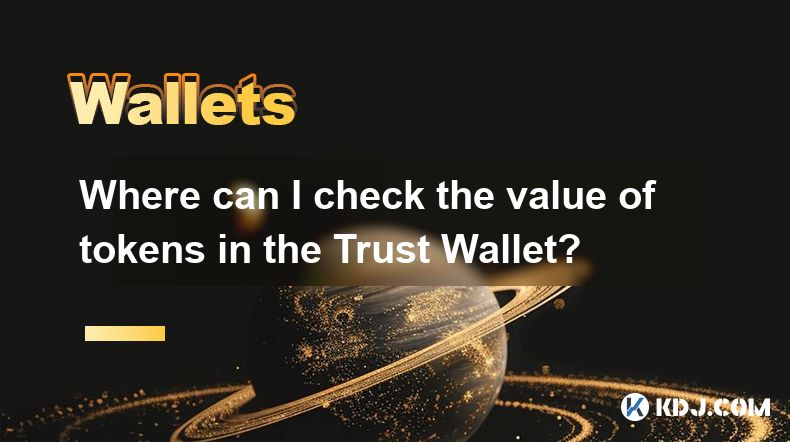
Where can I check the value of tokens in the Trust Wallet?
Apr 02,2025 at 11:14am
When using Trust Wallet, one of the most user-friendly and versatile cryptocurrency wallets available, checking the value of your tokens is a straightforward process. Trust Wallet supports a wide range of cryptocurrencies and tokens, making it a popular choice for both beginners and experienced users in the crypto space. To check the value of your token...
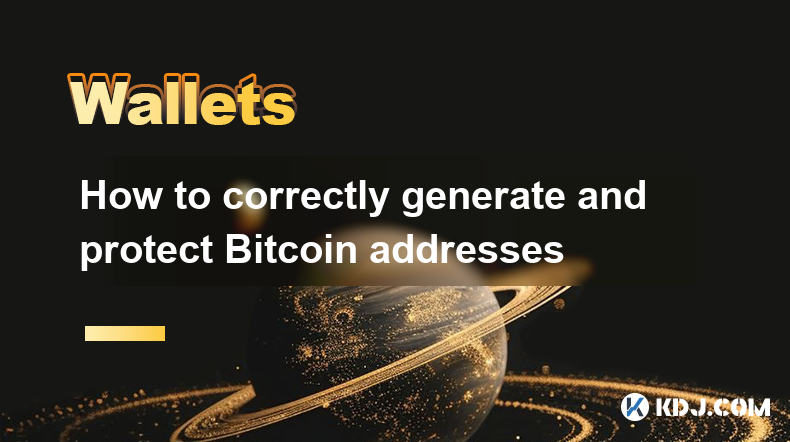
How to correctly generate and protect Bitcoin addresses
Apr 02,2025 at 06:49am
Understanding Bitcoin AddressesA Bitcoin address is like your bank account number. It's a unique identifier that allows others to send you Bitcoin. Unlike a bank account, however, Bitcoin addresses are generated cryptographically and are linked to your private keys. Losing your private keys means losing access to your Bitcoin. Therefore, generating and...
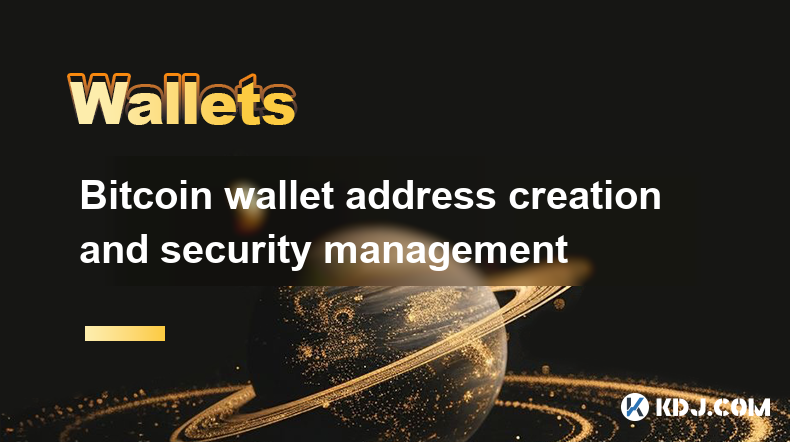
Bitcoin wallet address creation and security management
Mar 31,2025 at 10:56pm
Understanding Bitcoin Wallet AddressesA Bitcoin wallet doesn't store Bitcoin directly. Instead, it stores private keys which are long strings of characters. These keys grant access to your Bitcoin. Your public key, derived from the private key, is used to generate your Bitcoin wallet address, a unique identifier similar to a bank account number. This a...

How to easily generate a Bitcoin payment address
Mar 29,2025 at 10:49am
Generating a Bitcoin payment address might seem daunting, but it's actually quite straightforward. This process is crucial for receiving Bitcoin, as each transaction requires a unique address. Understanding how this works is fundamental to using Bitcoin effectively. This guide will walk you through the simple steps, regardless of your technical experti...
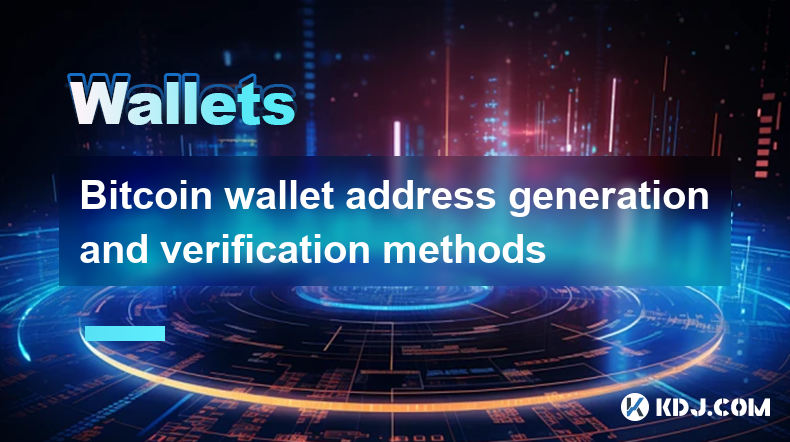
Bitcoin wallet address generation and verification methods
Apr 01,2025 at 11:01am
Understanding Bitcoin Wallet AddressesA Bitcoin wallet address is a unique identifier, similar to a bank account number, used to receive and send Bitcoin. It's a string of alphanumeric characters, crucial for participating in the Bitcoin network. Understanding how these addresses are generated and verified is paramount for secure Bitcoin transactions. ...
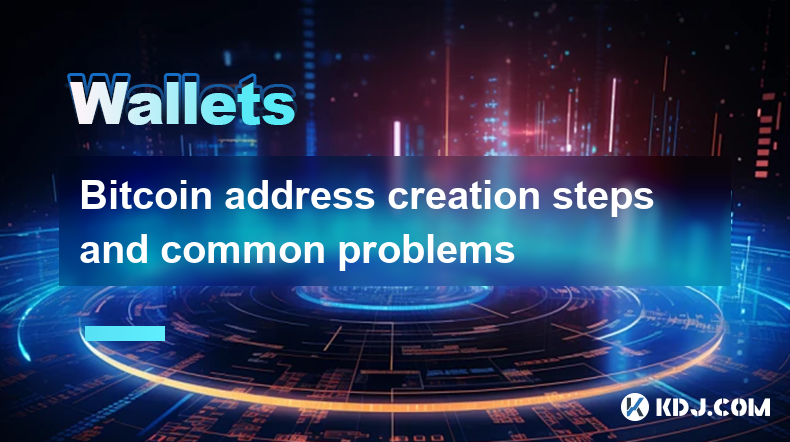
Bitcoin address creation steps and common problems
Mar 30,2025 at 06:07am
Understanding Bitcoin AddressesA Bitcoin address is a unique identifier, similar to a bank account number, used to receive Bitcoin. It's a string of alphanumeric characters generated from a public key, derived from your private key. Understanding the distinction between public and private keys is crucial for Bitcoin security. Your private key should be...

Where can I check the value of tokens in the Trust Wallet?
Apr 02,2025 at 11:14am
When using Trust Wallet, one of the most user-friendly and versatile cryptocurrency wallets available, checking the value of your tokens is a straightforward process. Trust Wallet supports a wide range of cryptocurrencies and tokens, making it a popular choice for both beginners and experienced users in the crypto space. To check the value of your token...

How to correctly generate and protect Bitcoin addresses
Apr 02,2025 at 06:49am
Understanding Bitcoin AddressesA Bitcoin address is like your bank account number. It's a unique identifier that allows others to send you Bitcoin. Unlike a bank account, however, Bitcoin addresses are generated cryptographically and are linked to your private keys. Losing your private keys means losing access to your Bitcoin. Therefore, generating and...

Bitcoin wallet address creation and security management
Mar 31,2025 at 10:56pm
Understanding Bitcoin Wallet AddressesA Bitcoin wallet doesn't store Bitcoin directly. Instead, it stores private keys which are long strings of characters. These keys grant access to your Bitcoin. Your public key, derived from the private key, is used to generate your Bitcoin wallet address, a unique identifier similar to a bank account number. This a...

How to easily generate a Bitcoin payment address
Mar 29,2025 at 10:49am
Generating a Bitcoin payment address might seem daunting, but it's actually quite straightforward. This process is crucial for receiving Bitcoin, as each transaction requires a unique address. Understanding how this works is fundamental to using Bitcoin effectively. This guide will walk you through the simple steps, regardless of your technical experti...

Bitcoin wallet address generation and verification methods
Apr 01,2025 at 11:01am
Understanding Bitcoin Wallet AddressesA Bitcoin wallet address is a unique identifier, similar to a bank account number, used to receive and send Bitcoin. It's a string of alphanumeric characters, crucial for participating in the Bitcoin network. Understanding how these addresses are generated and verified is paramount for secure Bitcoin transactions. ...

Bitcoin address creation steps and common problems
Mar 30,2025 at 06:07am
Understanding Bitcoin AddressesA Bitcoin address is a unique identifier, similar to a bank account number, used to receive Bitcoin. It's a string of alphanumeric characters generated from a public key, derived from your private key. Understanding the distinction between public and private keys is crucial for Bitcoin security. Your private key should be...
See all articles























































































